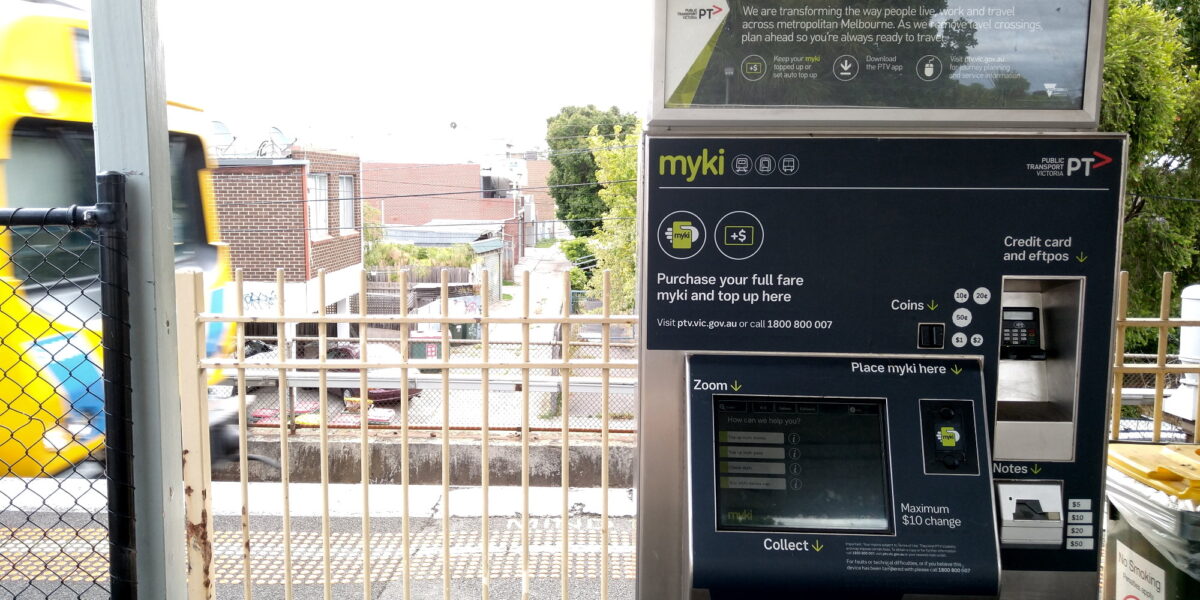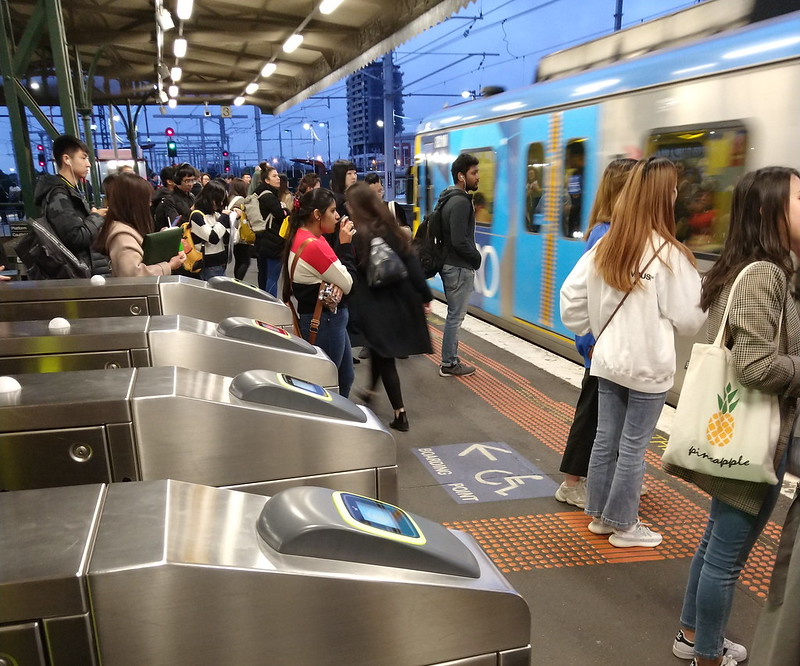There’s plenty happening as we head towards the State Election. More on that soon.
On Melbourne’s public transport, as on many systems, the cheapest fare available depends on how much you travel.
If you travel a lot, and buy a Myki Pass in advance, and you can save heaps of money.
Here are some examples for adult Zone 1 (or Zone 1+2) fares, comparing Myki Pass costs with the far more common Pay-As-You-Go Myki Money:
| Product | Cost | Per day (travel every day) | Per day (travel 5 days/week) [2] | Per day (travel 4 days/week) [3] |
| Myki 365 day Pass – via PTUA Commuter Club | $1685 [1] | $4.61 | $6.48 [2] | $8.10 [3] |
| Myki 365 day Pass retail | $1794 | $4.91 | $6.90 [2] | $8.62 [3] |
| Myki 33 day Pass (eg 5 weeks) | $182.16 | $5.52 | $7.29 | $9.11 |
| Myki 7 day Pass | $46.00 | $6.57 | $9.20 | $11.50 |
| Myki Money (daily fare) | $9.20 [4] | $9.20 [4] | $9.20 | $9.20 |
- [1] Includes PTUA membership. Commuter Club is also available through some employers – prices vary a bit.
- [2] Based on travelling 260 days per year.
- [3] Based on travelling 208 days per year. Over a year, someone who travels every working day, but never on weekends or public holidays, probably lands on about 230 days, assuming they also take some leave and don’t use PT then.
- [4] Weekends are cheaper, at $6.70 due to the weekend/public holiday cap.
To state the obvious: Myki Passes are for consecutive days, so once you’ve bought it, the more you travel, the cheaper it is.
And the more days you buy in advance, the cheaper it is. If you travel everyday on a Yearly Commuter Club ticket, you’re basically paying half price.
In contrast the 7-day Myki Pass is nearly useless. If you travel every weekday – but not on weekends – it’s the same price as Myki Money, so you might as well not bother.
(This wasn’t always the case. Prior to Myki Money becoming the standard fare, a Weekly was priced at 4.3 times a Daily, so at least there was a monetary incentive to buy it if planning to travel 5 days in the week.)
The problem with Passes
Aside from the doubtful value of the Weekly, there are three big problems with the current Pass regime.
1. Post-pandemic, there’s an awful lot of people travelling into work much less than they used to, making Passes near irrelevant to them.
(The Age recently reported that passengers using 28+ day Passes had dropped by three-quarters since 2019.)
2. Sometimes it’s hard to know in advance how much you’ll travel – so it can be a gamble. And you have to make the effort to buy it.
And worst of all:
3. The people who are most likely to need the discounts, those who are watching their spending, may not be able to get them – because of the upfront cost.
This is where fare caps come in.
The benefits of caps
Fare capping means you just travel on Pay-As-You-Go (eg Myki Money) fares, and once you’ve reached a certain threshold, any additional travel is free.
Myki already has it for daily fares: you pay a maximum of two 2-hour fares per day.
A number of public transport systems use weekly or monthly fare caps, for example:
- Sydney – $50/week cap
- Canberra – 40 trips per calendar month
- Portland – ditto
- London – between 3 and 5 days of travel
- New York City – 12 trips per week
If the cap is done on a weekly basis (assuming a Monday start), this can help to encourage weekend usage, when the system is normally quieter.
Fare caps are also great for low income earners, especially those who travel every day, because they get the benefits of discounts without the upfront cost.
In some circles this is seen as an important social equity measure. Why should only the wealthy be able to afford the discounts?
We know that Myki is set to be significantly upgraded in the near future, including a shift to bank-issued payment cards, which can make the system more attractive to occasional users, encouraging them to become regulars.
Let’s hope that they also take the opportunity to introduce automatic fare caps – at the very least to replace the near-useless 7-day Pass.
- Last year the PTUA marked 40 years of the Zone fare system in Melbourne by calling for the replacement of the 7-Day Pass with a weekly cap.
- Vix: What is Fare Capping?


2 replies on “Public transport fare caps”
[…] but also other issues such as the high price of short trips, incentives to travel off-peak, and weekly fare caps instead of preloaded Myki Passes – while not sacrificing so much revenue that needed service […]
[…] (One they absolutely should do is weekly fare caps.) […]